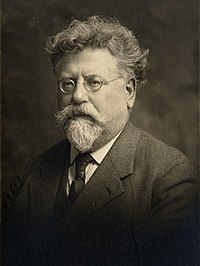Indriði Steinsson: Difference between revisions
No edit summary |
m (1 revision imported) |
Latest revision as of 03:39, 27 March 2019
Indriði Steinsson | |
|---|---|
 Steinsson in 1887 | |
| Born | 11 May 1834 |
| Died | 4 July 1902 (aged 68) |
Notable work | Achieving Socialism From Private Ownership to Common Ownership |
| Era | 19th century philosophy |
| School | Marxism Syndicalism |
Main interests | Socialism Trade Unions Syndicalism |
Notable ideas | General Strike |
Influences | |
Influenced | |
Indriði Steinsson was an Atlantican philosopher, economist and trade union activist best known for his contributions to Socialism and more particularly Syndicalism and his role in founding the the Atlantican Socialist Party.
Steinsson is best known for his political ideas, which he categorised as a branch of the thinking Lydwig Welz had developed, although others categorised it as a fusion of Marxism and Syndicalism; his thinking, as detailed in his 1862 book Achieving Socialism held that the best way to achieve a socialist society was via a General Strike via trade unions, which would function as the main vanguards of a potential Socialist Revolution; however, Steinsson caused controversy within the socialist movement by advocating for temporary reformism within the political realm to create laws that would benefit trade unions, to allow for the eventual general strike; however, Steinsson firmly stated that this was the only use for Reformism, unless said laws were under attack, in which case active protection would be necessary.
Although Steinsson today is best known for his ideas of creating a socialist society (a topic Welz notably did not cover), his economic ideas, as detailed in his 1866 book From Private Ownership to Common Ownership, which directly led to the creation of Syndicalism, are probably more important (and Steinsson's ideas of creating a socialist society were never really used outside of Atlantica, before socialist groups eventually pursued a more reformist path), as Steinsson argued for a Syndicalist economy as a temporary measure during the dictatorship of the proletariat, before the withering away of the state (as detailed by Welz), under which the economy would be transitioned to one based on common ownership of the means of production under the framework of a anarcho-communist society as detailed by Welz.
Although Steinsson is best known as a political and economic philosopher, he additionally played major roles in the Atlantican Federation of Labour and the founding of the Atlantican Socialist Party, serving as the ASA General Secretary from 1869 to 1887 (when the ASA became a socialist union and helped found the Socialists) and as the General Secretary of the ASA he is generally credited with being the main force behind the founding of the Socialist Party and the Socialists from their founding in 1870 to the founding of the Communist Party in 1880; his ideas were officially the main ideas of the Socialist Party until the 1920s, although he never actually led the Socialists or ever stood for elected office, seeing running for office as compromising his ideals.
After the 1880s, Steinsson became considerably less active in public life, focusing instead on giving small lectures to trade union activists and to students the University of Stórkostlegurborg before his death in 1902. His particular ideology has almost entirely fallen out of popularity after enjoying massive popularity during Steinsson's life, although his role in founding Syndicalism is generally considered to be a major contribution to socialist theory; elements of his economic ideas have been used in Phazayazk (although the Phazayazki economy employs central planning, something Steinsson publicly detested), anarcho-syndicalism became a major ideology within the anarchist movement after his death (although Steinsson did not consider himself to be an anarcho-syndicalist), whilst in the early 20th century, political parties on the radical nationalist right, most prominently the Korbathian National Agricultural Labourer's and Worker's Party (although after 1923 the KNALWP abandoned its previous syndicalist ideas in favour of fascism) mixed Steinsson's ideas with their own nationalism (some Steinsson despised, as Steinsson, who was a proletarian internationalist, saw nationalism as merely something that divided the workers) to form national syndicalism.
Early Life
Steinsson was born to middle-class skilled workers in Stórkostlegurborg.
Personal life
Steinsson never married and was an atheist.